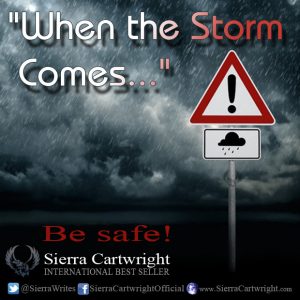 For Hurricane Harvey, I was in Houston, rather than Galveston, somewhere inland and, presumably, safe since it wasn’t in a flood plain. And yet, houses all around us flooded. Vehicles were destroyed.
For Hurricane Harvey, I was in Houston, rather than Galveston, somewhere inland and, presumably, safe since it wasn’t in a flood plain. And yet, houses all around us flooded. Vehicles were destroyed.
I saw things I wish I hadn’t, experienced things I never want to relive. And I want to share a few things I learned so that things might be a little easier, in case you have to face the unthinkable.
Above all: trust your instincts. Please. Even if everyone around you thinks it’s hype, that nothing will happen, trust yourself. (Even if nothing happens. What did being prepared hurt?)
Things that were lifesavers for myself and friends:
Ziploc-type bags, water (in gallon jugs and in cases of bottles), plastic document wallets, oversized trash bags, storage bins.
Keep your phone and charger in a Ziploc bag. Not only will the bag protect it from water damage, if you drop your phone, it may float for a few seconds. (This is also important for anyone heading out to help.)
Wrap your luggage, computer bag, etc. inside a heavy-duty (black) trash bag. Also, trash bags can be cut so that they can be used as rain ponchos.
During Hurricane Harvey, we lost cell phone service and Wi-Fi access. A family we assisted needed to get to a friend’s house, but they couldn’t call the friend and they did not remember the address.
So be sure to have a paper copy of all important information: passwords for all your credit cards and banks, logins for online banking, credit cards, email, etc. (If you login from a new location, you may be prompted for the login information.) Place this information inside a large Ziploc or document wallet.
Also be sure to include your insurance agent’s name and phone number. (Our good friend is an insurance agent. Some people called him who were no longer clients. In their panic, and because documents were destroyed, they couldn’t recall who their agent was.) Also, consider having your car’s VIN number handy.
Also, place your money, credit cards, checkbooks, wallet, passport, birth certificate, citizenship papers in plastic baggies.
Things to ensure you have for a disaster:
Medications, diabetic supplies, and over-the-counter pain remedies for yourself and kiddos/family members. (Also place in Ziploc baggies.) Have enough for at least a week, maybe longer.
- Female sanitary products.
- Diapers, baby food, formula, etc.
- Candles. Many bigger stores may carry inexpensive 24-hour candles in their Jewish section. (Thank you to a good friend for this tip!)
- Matches (store in plastic Ziploc bag), lighters.
- A battery-operated lantern.
- Batteries.
- Flashlights.
- A camp stove. (Being able to boil water to pour through the coffeemaker made our two-days without power much more tolerable.)
- Umbrellas. (Though the wind made some of these more of a detriment than an asset.)
- Rain jacket/poncho/black plastic bag in a pinch. Also rain boots.
The stores will run out of bread and snacks first. Grab your snacks early. And do not eat them before the hurricane arrives. (Learned the hard way.) The grocery store also ran out of M&M’s. You can buy your bread early and freeze it, removing it when you go to freeze the one-gallon water jugs.
Also consider:
Cash. The ATMs around us flooded or lost power.
Having a full gas tank. This is good in case you need to evacuate, but keep in mind your car may have to be used for heat/cooling or recharging your electronic devices.
Purchasing spare gasoline for a chain saw, etc.
Leading up to the storm:
Take a moment to get your pets chipped. At the very least, ensure their tags are readable.
From a friend with a degree in disaster management: Take photos of the inside and outside of your home right from your phone. If you have any damage, you can provide these to the insurance adjuster without needing to search old photos.
Place photos, valuable papers, books, etc. inside plastic storage bins. ALSO, your washing machine can be used for storage of valuables/breakables. (Wrap them with towels for protection.)
Bring your pet carriers into the house early. I heard of one family forced to leave behind four cats because the carriers were flooded in the garage. Also have leashes, dishes, dog toys handy.
Place towels in windowsills. (During a tornado, rain and blades of grass came into my Jamaica Beach house through the window seals!)
One gallon jugs of water can be frozen. If you lose power, those bricks of ice can then be used to keep items in your refrigerator cold. Move the items you access the most (beer and wine) to the front of the refrigerator to minimize time you have the doors open. (I have heard to be sure to leave some head room if you fill your own one-gallon jugs, to allow for expansion.)
Fill the bathtub with water that can be used to flush toilets.
If you are evacuated, you may have a couple of days notice, an hour’s notice, or the Sheriff could knock on your door at 1:00 a.m. with a “go-now” command.
Have a grab-and-go bag ready. Consider using a backpack so that you can keep your hands free. You can cut a couple of holes in a trash bag to cover your backpack but still slip your arms through the straps. In the bag, have all your other Ziploc bags (medication, sanitary supplies, money, wallet, credit cards, ID, credit cards, check book, names, phone numbers, addresses, and login information. Also a baggie with your electronics.) (I saw a family forgot most of their essentials in the panic to evacuate.) Also, consider tossing in a flashlight. If it’s dark, you may not recognize where you are when you get off a boat.
If you evacuate:
Please know a dozen people will be there to help. You may feel alone, but your neighbors, friends, first responders will be there to help you.
- Wear shoes that can get wet. (We saw a number of people who lost/removed shoes that were water logged.)
- If you travel, call your credit card companies and banks so your card/account is not subject to a fraud hold.
- Contact FEMA to help with expenses, etc. Contact your insurance agent.
What you will need in the aftermath:
Trash bags, cleaning supplies, mops, brooms, a camera or cell phone camera for pictures of damage, storage bins for things you can salvage, maybe a pair of rainboots. Save receipts.
The most important thing I needed…
A feeling of grace. People, including your spouse or loved one, may not react the way you expect. The shock of being evacuated or losing a home or vehicle is stunning. Be patient with yourself and others. (Yes, I do know, firsthand, how difficult this one can be!)

Leave a Reply
You must be logged in to post a comment.